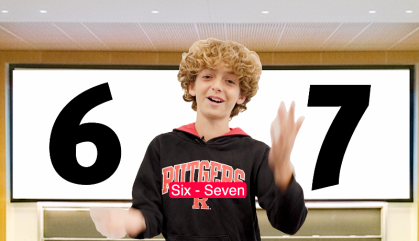This year, Dictionary.com selected a word of the year that is not even technically a word - it's more of an inside joke among young people that technically has no meaning. But if you've had a conversation with any teens or tweens lately, you've probably heard them randomly say: 6-7.
How did a phrase without definition become the word of the year? How did 6-7 ricochet around world to become ubiquitous in middle school and high school halls?
We talked to Kristen Syrett, who studies linguistics and language acquisition in the School of Arts and Sciences at Rutgers-New Brunswick, about 6-7 entry into the lexicon. As a linguist who attends the American Dialect Society's Word of the Year vote every January -and a mom to a 16-year-old son -it's a topic that has fascinated her too and slipped into her vocabulary.

The word of the year is supposed to capture a pivotal moment in language and culture, according to Dictionary.com. What do you think it says about this moment in time that 6-7 is the word of the year?
The word of the year captures a kind of swell of linguistic excitement in pop culture and seems to celebrate one person's or population's contribution to our collective attention and mindset. We can think of something similar that happened when "not" or "psych" became super popular post-sentence tags in the '80s and early '90s. Yes, they contributed some meaning (what we might technically call propositional negation - "not that!" or "I don't mean that!") but in saying it, you showed you were speaking the language of your generation.
Does 6-7 have any meaning, or is there meaning in having no definition?
"6-7" may have a meaning, and there may be a dispute about what that meaning is. I think the reason it has caught on is that this phrase, in and of itself, doesn't convey a particular meaning. Rather than thinking of it contributing a meaning like an "open-class" word does (a word like a noun, like "dog" or "umbrella" or a verb like "run" or "think"), I like to think of it as more of a discourse marker that contributes meaning in another, more social way. The fact that it is accompanied by what we would call a "co-speech gesture" (the open, extended hands moving up and down) means that the utterance and the gesture together can serve as a signal of being part of an in group.
In a way, I think asking about the definition defeats the purpose. "What does that even mean?!" "Bruh. It just IS."
How do you think 6-7 can earn this designation if it's not even a word?
The word of the year votes gradually started to allow entries and acknowledge winners that we might not think of as "words" a while ago. Doing so started to push the boundaries of what a "word" is and of what we think of as a meaningful chunk of sound that captures a pivotal moment.
Consider "jump the couch" (inspired by Tom Cruise jumping on Oprah Winfrey's coach during an interview to express his love for Katie Holmes) or the Gen Z slang "let x cook". These are chunks of sound in the ether that convey not just a word-level meaning, but a collective social meaning that unites certain people and captures where we were, what influenced us, or what occupied our attention in a point in time.
What do you know about the origins of 6-7?
I've heard the Skrilla song, seen the basketball videos, seen the video of the kid in the bleachers, and so many other things that blew up since. It seems like it was a convergence of these things, the simplicity of the phrase, and the silliness of getting so excited by it that led to it taking off.






